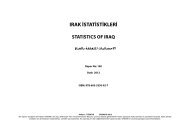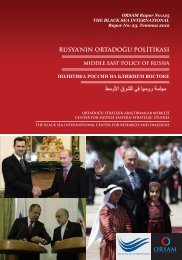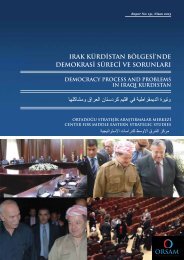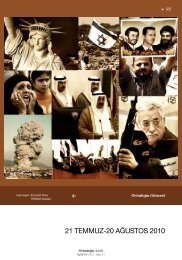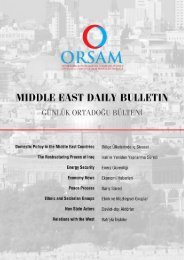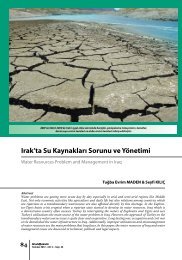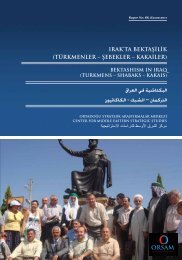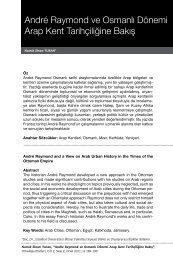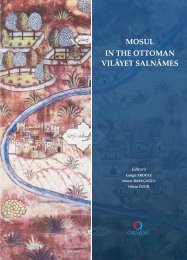IRAK ÇERKESLERİ - orsam
IRAK ÇERKESLERİ - orsam
IRAK ÇERKESLERİ - orsam
Create successful ePaper yourself
Turn your PDF publications into a flip-book with our unique Google optimized e-Paper software.
IRAQI CIRCASSIANS (Chechens, Dagestanis, Adyghes)<br />
ORSAM<br />
- The society organized its second congress<br />
in Kirkuk.<br />
- Training courses were organized to contribute<br />
to development of the society<br />
members. In the aforesaid courses, the participants<br />
were informed about the native<br />
language, history and culture. The Khabze<br />
culture, which is the national tradition of<br />
Adyghes, was strived to be taught.<br />
- Besides the financial support provided<br />
during the Ramadan months, Circassian<br />
families and also the families from other<br />
ethnic and religious groups with low-income<br />
are provided with food and financial<br />
support.<br />
- In some schools, stationery and clothing<br />
support is provided for orphan children.<br />
- The members of Al-Tadamun paid visits<br />
to the Circassian Charity Association in<br />
Jordan and also the Circassian Charity Association<br />
in Syria. In Turkey, they visited<br />
North Caucasian associations and federations<br />
in İstanbul, Ankara, Kayseri and<br />
Düzce. There was a participation in conferences<br />
and workshops in places they visited.<br />
On the other hand, in order to teach Adyghe<br />
language, the society has been planning<br />
to open courses in Kirkuk. Particularly in<br />
Kirkuk, the society has been striving to develop<br />
relations among the Turkmen, Arab,<br />
Kurdish and Christian groups.<br />
5. Conclusion<br />
The Circassians, who were settled in current<br />
Iraqi territories during the period of Ottoman<br />
Empire, went through the same fate in<br />
Iraq as they did in almost every other place<br />
they settled in, and they were exposed to the<br />
same oppression and assimilation policies<br />
by the current authoritarian regimes as they<br />
were considered as a part of the Ottoman<br />
Empire. Despite these policies, Circassians<br />
contributed to the countries they lived in to<br />
a great extent. As a result of the local forces’<br />
struggle for power after 2003, the oppression<br />
policies in the Saddam Hussein turned<br />
into the pressure of local forces. Besides, the<br />
ethnical, religious and sectarian polarization<br />
prevailing in Iraq became influential. Striving<br />
to introduce their identities again today, Iraqi<br />
Circassians have been trying to turn it into an<br />
organized structure through this society they<br />
established in 2004. However, it is hard to<br />
suggest that Circassians in Iraq aer regarded<br />
as a different identity. In fact, they have been<br />
deprived of the rights of other minorities (for<br />
instance, the quote in the Iraqi Parliament or<br />
provincial councils), and they do not have opportunity<br />
to contribute to preserving cultural<br />
rights such as education in their native language.<br />
Considering the unstable structure in<br />
Iraq, it is obvious that Iraqi Circassians have<br />
been going through hard times to preserve<br />
their identity. Nevertheless, it is believed that<br />
in order to reinforce the democracy in Iraq,<br />
it is required to fairly recognize the communities<br />
preserving their own language, social<br />
structure and culture.<br />
ORSAM<br />
Report No: 134, November 2012 19




